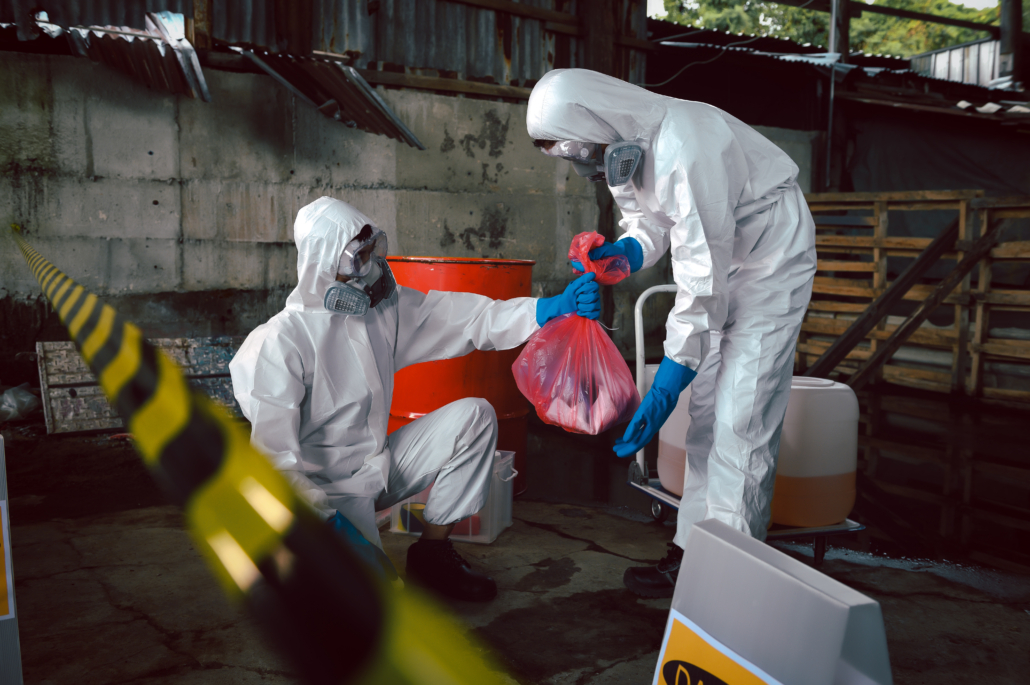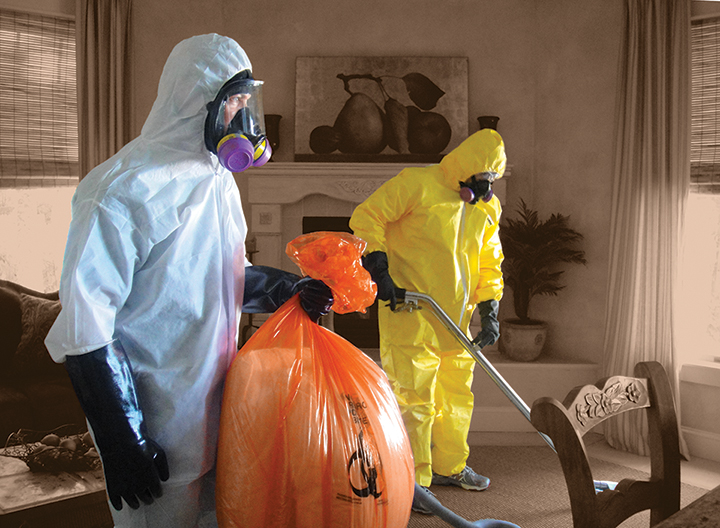Clandestine Lab Cleanup: Comprehensive Decontamination for Hazardous Sites
Clandestine Lab Cleanup: Comprehensive Decontamination for Hazardous Sites
Blog Article
Professional Biohazard Cleaning and Decontamination for Blood, Bodily Fluids, and Hazardous Products
The potential health risks connected with direct exposure to biohazards emphasize the crucial need for thorough handling and thorough cleanup. As we navigate the detailed landscape of biohazard cleaning, understanding the nuances of policies, conformity, and the specific tools at play comes to be imperative in ensuring a thorough and safe decontamination process.
Wellness Threats of Biohazard Direct Exposure
Exposure to biohazards postures substantial wellness threats that can cause serious repercussions for people and neighborhoods alike. Biohazards include a wide variety of biological compounds, including blood, physical liquids, mold, germs, viruses, and other potentially infectious materials. When people enter into contact with these biohazards, whether via crashes, inappropriate handling, or ecological exposure, they deal with the danger of contracting major ailments or diseases.
Among the primary health threats related to biohazard direct exposure is the transmission of transmittable diseases. Bloodborne pathogens such as HIV, hepatitis B and C, and different bacteria can be present in biohazardous materials, posturing a straight threat to human wellness. Breathing in airborne biohazards like mold and mildew spores or entering into contact with contaminated surfaces can likewise cause respiratory issues, allergic reactions, and other negative wellness impacts.
Additionally, biohazard exposure can have long-lasting wellness implications, with some diseases manifesting years after the first call (Blood Cleanup). Consequently, it is essential to prioritize appropriate biohazard cleansing and decontamination to minimize these health and wellness threats and make sure the safety and security of communities and individuals

Specialized Educating for Biohazard Cleanup
When it concerns managing biohazard cleaning successfully and safely, specialized training plays a fundamental duty in ensuring appropriate decontamination treatments are adhered to. Biohazard cleaning requires details expertise and skills to effectively reduce dangers connected with bloodborne pathogens, physical fluids, and hazardous products. Experts trained in biohazard clean-up go through extensive guideline on exactly how to safely deal with, remove, and get rid of biohazardous products to stop contamination and exposure.
Specialized training for biohazard cleaning covers a variety of crucial topics, consisting of proper individual safety equipment (PPE) usage, bloodborne pathogen recognition, decontamination techniques, and contaminated materials disposal methods. People learnt biohazard cleaning are geared up with the necessary expertise to evaluate contamination levels, recognize possible hazards, and carry out suitable cleanup treatments in conformity with regulatory requirements.
Constant training and education and learning are critical in the field of biohazard clean-up to stay upgraded on the current decontamination innovations, safety and security protocols, and guidelines. By investing in specialized training, biohazard cleanup specialists can properly reply to emergency cleaning scenarios and protect both public health and the atmosphere.
Importance of Appropriate Decontamination Methods
Making use of proper purification techniques is vital in biohazard cleanup to properly get rid of dangerous products and minimize health risks. Efficient decontamination not just ensures the elimination you could try this out of noticeable traces of blood, physical liquids, and other biohazards but additionally targets unnoticeable pathogens that might pose significant health dangers if not correctly eliminated. By complying with strict decontamination procedures, educated specialists can significantly reduce the risk of direct exposure to hazardous microorganisms, viruses, and germs that can result in illness or infections.
Appropriate decontamination methods involve the usage of customized tools and anti-bacterials that are specifically made to neutralize biohazards properly. Comprehensive cleaning and disinfection of infected locations are important to protect against the spread of virus and ensure a risk-free atmosphere for residents. In addition, the appropriate disposal of biohazardous waste complying with decontamination procedures is vital in avoiding contamination of other surfaces or people.

Tools and Tools for Safe Cleanup
When dealing with blood, physical fluids, or unsafe products, biohazard cleansing experts depend on specialized gear to decrease exposure dangers and extensively decontaminate the affected area. Furthermore, biohazard cleaning sets having anti-bacterials, absorptive products, and biohazard bags are utilized to securely contain and get rid of of infected items.
Advanced cleaning tools like hospital-grade anti-bacterials, HEPA-filtered vacuums, and misting devices are employed to sterilize surface areas and eliminate biohazards effectively. Specialized devices such as sharps containers and biohazard waste disposal bins are made use of to securely take care of sharp objects and biohazardous waste materials. By utilizing the ideal tools and devices, biohazard cleaning specialists can guarantee a comprehensive cleaning process that focuses on security and minimizes health and wellness risks for both workers and owners of the afflicted area.
Laws and Compliance in Biohazard Cleansing
Correct adherence to regulations and conformity requirements is extremely important in biohazard cleansing to make certain the safety and security of both personnel and the setting. Federal government firms such as OSHA (Occupational Safety and Health Management) and the EPA (Environmental Security Firm) have established details guidelines for biohazard clean-up treatments to lessen wellness risks and environmental contamination. These laws cover a series of aspects including the handling, transportation, and disposal of biohazardous products, along with the required training and safety tools required for workers entailed in the directory clean-up process.
Biohazard cleaning firms should remain updated with these policies to assure that their operations satisfy the called for security standards. Failing to abide by these laws can cause extreme repercussions, including fines, legal activity, and endangering the health of individuals and the environment. By complying with rigid laws and compliance steps, biohazard cleaning firms can properly alleviate risks and make certain a extensive and safe cleanup procedure for all parties involved.
Verdict
In final thought, biohazard cleaning and purification need specialized training, proper methods, and adherence to laws. Exposure to blood, bodily liquids, and harmful materials presents considerable health and wellness threats, making it vital to utilize the ideal equipment and tools for risk-free cleaning. By following strict methods and guidelines, specialists can efficiently minimize the dangers connected with biohazard direct exposure and guarantee the safety and security of both themselves and others.
As we browse the intricate landscape of biohazard clean-up, comprehending the subtleties of policies, conformity, and the specialized equipment at play becomes essential in making sure a safe and extensive purification procedure. (Blood Cleanup)
When it comes to taking care of biohazard clean-up efficiently and securely, specialized training plays an essential duty in making sure correct purification treatments are adhered to.Making use of correct decontamination strategies is crucial in biohazard cleanup to properly eliminate hazardous products and decrease health and wellness threats. Additionally, biohazard cleansing packages having disinfectants, absorbent products, and biohazard a fantastic read bags are utilized to safely consist of and get rid of of contaminated things.
Government firms such as OSHA (Occupational Safety And Security and Wellness Management) and the EPA (Environmental Protection Agency) have actually developed certain guidelines for biohazard cleanup procedures to lessen health and wellness dangers and environmental contamination.
Report this page